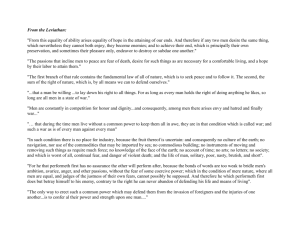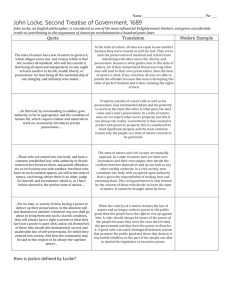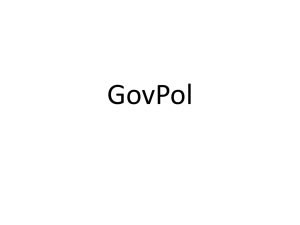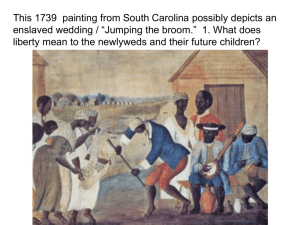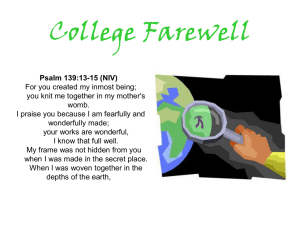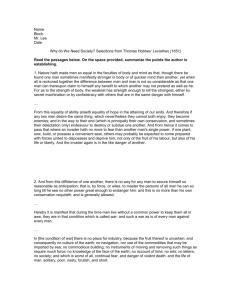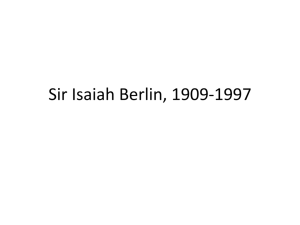Political Definitions
advertisement
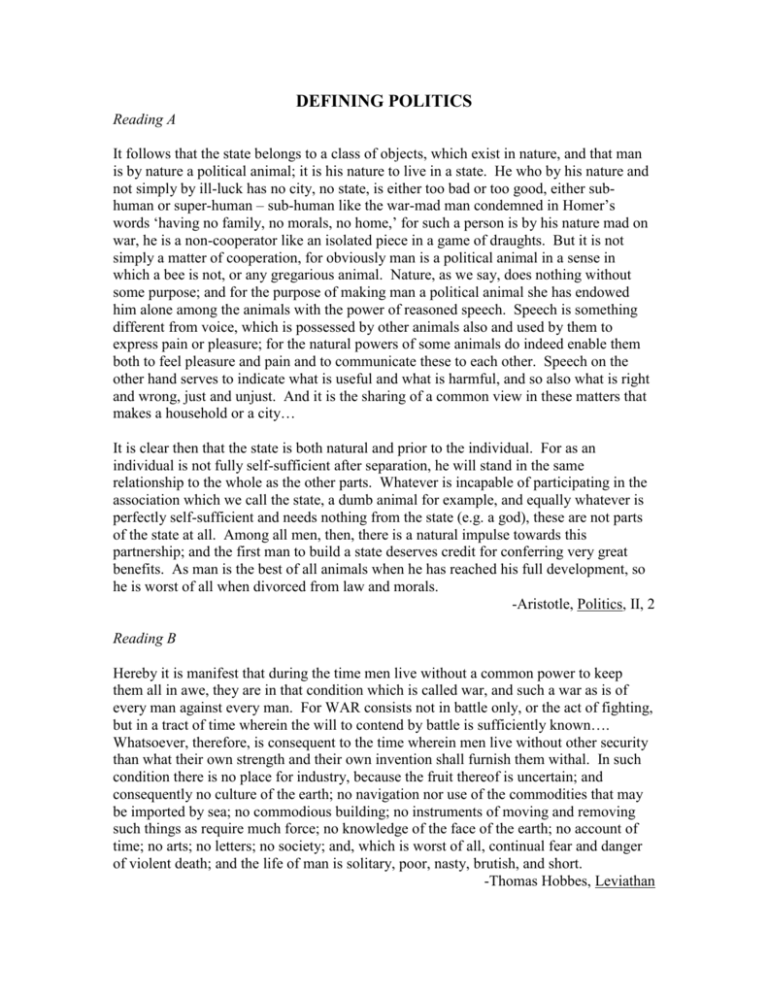
DEFINING POLITICS Reading A It follows that the state belongs to a class of objects, which exist in nature, and that man is by nature a political animal; it is his nature to live in a state. He who by his nature and not simply by ill-luck has no city, no state, is either too bad or too good, either subhuman or super-human – sub-human like the war-mad man condemned in Homer’s words ‘having no family, no morals, no home,’ for such a person is by his nature mad on war, he is a non-cooperator like an isolated piece in a game of draughts. But it is not simply a matter of cooperation, for obviously man is a political animal in a sense in which a bee is not, or any gregarious animal. Nature, as we say, does nothing without some purpose; and for the purpose of making man a political animal she has endowed him alone among the animals with the power of reasoned speech. Speech is something different from voice, which is possessed by other animals also and used by them to express pain or pleasure; for the natural powers of some animals do indeed enable them both to feel pleasure and pain and to communicate these to each other. Speech on the other hand serves to indicate what is useful and what is harmful, and so also what is right and wrong, just and unjust. And it is the sharing of a common view in these matters that makes a household or a city… It is clear then that the state is both natural and prior to the individual. For as an individual is not fully self-sufficient after separation, he will stand in the same relationship to the whole as the other parts. Whatever is incapable of participating in the association which we call the state, a dumb animal for example, and equally whatever is perfectly self-sufficient and needs nothing from the state (e.g. a god), these are not parts of the state at all. Among all men, then, there is a natural impulse towards this partnership; and the first man to build a state deserves credit for conferring very great benefits. As man is the best of all animals when he has reached his full development, so he is worst of all when divorced from law and morals. -Aristotle, Politics, II, 2 Reading B Hereby it is manifest that during the time men live without a common power to keep them all in awe, they are in that condition which is called war, and such a war as is of every man against every man. For WAR consists not in battle only, or the act of fighting, but in a tract of time wherein the will to contend by battle is sufficiently known…. Whatsoever, therefore, is consequent to the time wherein men live without other security than what their own strength and their own invention shall furnish them withal. In such condition there is no place for industry, because the fruit thereof is uncertain; and consequently no culture of the earth; no navigation nor use of the commodities that may be imported by sea; no commodious building; no instruments of moving and removing such things as require much force; no knowledge of the face of the earth; no account of time; no arts; no letters; no society; and, which is worst of all, continual fear and danger of violent death; and the life of man is solitary, poor, nasty, brutish, and short. -Thomas Hobbes, Leviathan Reading C To understand political power aright, and derive it from its original, we must consider what state all men are naturally in, and that is a state of perfect freedom to order their actions and dispose of their possessions and persons as they think fit, within the bounds of the law of nature, without asking leave, or depending upon the will of any other man…. But though this be a state of liberty, yet it is not a state of license, though man in that state has an uncontrollable liberty to dispose of his person or possessions, yet he has not liberty to destroy himself, or so much as any creature in his possession, but where some nobler use than its bare preservation calls for it. The state of nature has a law of nature to govern it, which obliges every one; and reason, which is that law, teaches all mankind who will but consult it, that, being all equal and independent, no one ought to harm another in his life, health, liberty, or possessions. -John Locke, Second Treatise of Civil Government Reading D The love of the whole is not extinguished by [a] subordinate partiality. Perhaps it is a sort of elemental training to those higher and more large regards, by which alone men come to be affected…in the prosperity of a kingdom…. To be attached to the subdivision, to love the little platoon we belong to in society, is the first principle…of public affections. It is the first link in the series by which we proceed towards a love of our country and of mankind. -Edmund Burke, Reflections on the Revolution in France Reading E As the state arose from the need to hold class antagonisms in check, but as it arose, at the same, in the midst of the conflict of these classes, it is, as a rule, the state of the most powerful, economically dominant class which, and thus acquires new means of holding down and exploiting the oppressed class. Thus, the state of antiquity was above all the state of the slave owners for the purpose of holding down the slaves, as the feudal state was the organ of the nobility for holding down the peasant serfs and bondsmen, and the modern representative state is an instrument of exploitation of wage labour by capital. By way of exception, however, periods occur in which the warring classes balance each other so nearly that the state power, as ostensible mediator, acquires, for the moment, a certain degree of independence of both. Such was the absolute monarchy of the seventeenth and eighteenth centuries, which held the balance between the nobility and the class of burghers; such was the Bonapartism of the First, and still more of the Second French Empire, which played off the proletariat. The latest performance of this kind, in which ruler and ruled appear equally ridiculous, is the new German Empire of the Bismarck nation: the capitalists and workers are balanced against each other and equally cheated for the benefit of the impoverished Prussian cabbage Junkers. -Friedrich Engels, The Origin of the Family, Property and the State

